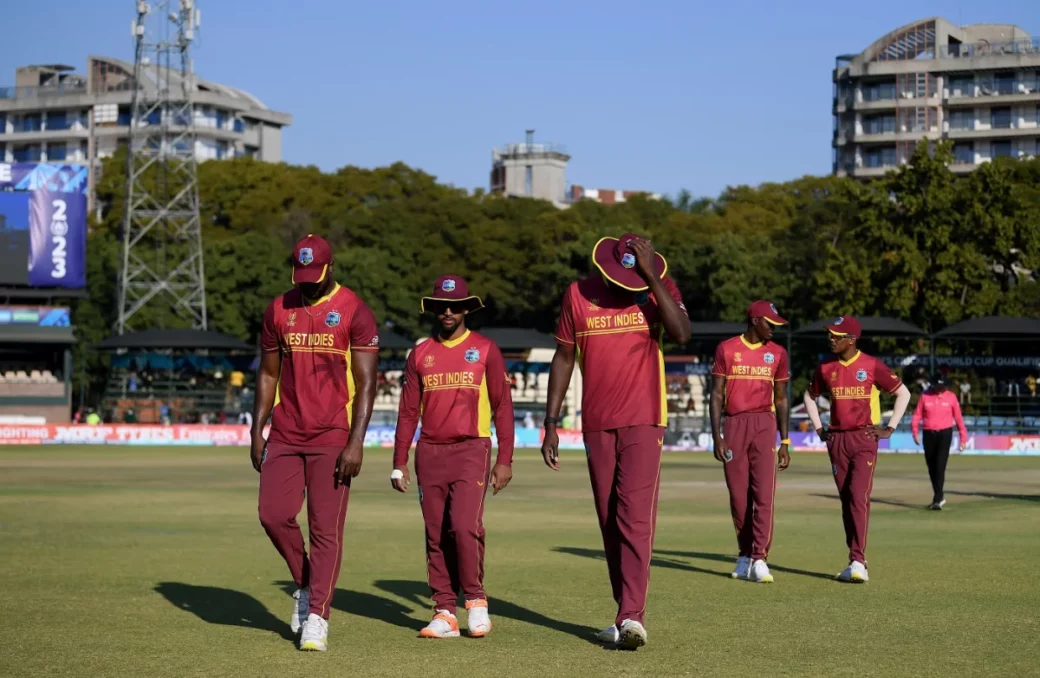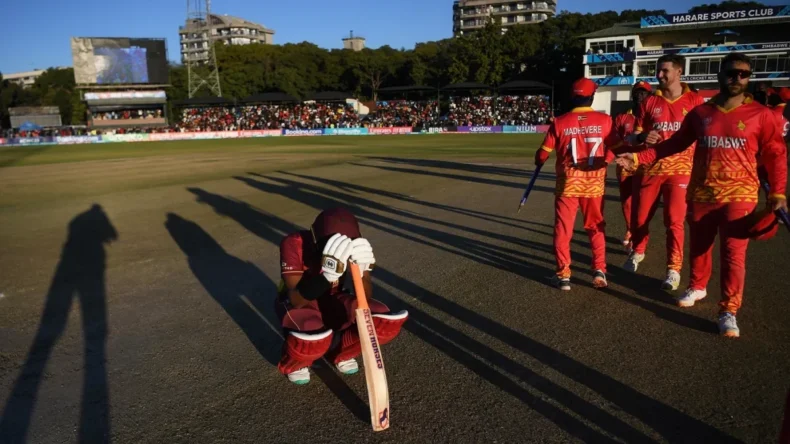Two-Time World Champions West Indies has failed to qualify for the upcoming ODI World Cup, marking the first time in the tournament’s history that they will not be a part of it. The team’s elimination came after a crushing defeat against Scotland in the Super Six contest of the qualifiers, leaving West Indies cricket in a state of unimaginable despair.
Scotland’s Impressive Victory
West Indies, boasting a lineup filled with T20 superstars, suffered a humiliating seven-wicket loss to Scotland after posting a modest total of 181 runs in 43.5 overs. Scottish all-rounder Brandon McMullen played a vital role in the victory, taking three wickets and scoring a patient 69 off 106 balls. The top scorer for the West Indies was Jason Holder with a painstaking 45 off 79 balls. Scotland comfortably chased down the target in just 43.3 overs, ensuring West Indies’ absence from the ODI World Cup for the first time since its inception in 1975. This victory was also significant for Scotland as it marked their first-ever win against them. The defeat has dealt a severe blow to their cricket, leaving fans and pundits questioning the current state of the team.
Decades of Decline

The decline of West Indies cricket over the past two decades has been a cause for concern among fans and cricket pundits alike. While the team enjoyed immense success in the 1970s and 1980s, winning two consecutive ODI World Cups and dominating Test cricket, their performance has steadily deteriorated since then. The once formidable team, known for its intimidating pace attack and powerful batting lineup, has struggled to regain its former glory in recent times.
Impact of T20 and League Cricket
One significant factor contributing to the challenges faced by West Indies cricket is the rise of T20 cricket and the associated leagues worldwide. The emergence of highly lucrative leagues, such as the Indian Premier League (IPL) and the Big Bash League (BBL), has presented West Indies players with lucrative opportunities to showcase their skills and earn substantial financial rewards. Consequently, many top West Indies players have prioritized participating in these leagues over representing their national team.
The allure of T20 cricket has led to a shift in focus among players, with greater emphasis placed on individual performances and personal gains rather than collective success with the national team. The constant exposure to T20 leagues and the financial rewards they offer have, to some extent, diluted the players’ commitment to the West Indies team and its long-term development.
Poor Administration and Lack of Commitment
Another major challenge faced by West Indies cricket is poor administration and persistent player-board disputes. Issues surrounding player contracts, payment disputes, and the overall management of the sport have plagued their cricket for years. These administrative shortcomings have created a sense of instability and a lack of trust between the players and the board.
Moreover, the lack of commitment from both the players and the board toward the national team’s progress has further hindered international cricket. The absence of a cohesive and united approach to developing and nurturing talent, as well as addressing the challenges faced by the team, has perpetuated the decline in performance.
The Road Ahead
The elimination from the World Cup 2024 serves as a wake-up call for West Indies cricket, signalling the need for immediate action and a comprehensive roadmap for revival. To address the decades of decline, several key areas require attention.
There is an urgent need to invest in talent development at the grassroots level. The board must prioritize identifying and nurturing young talents from across the Caribbean islands. This includes improving infrastructure, establishing effective coaching programs, and providing ample opportunities for talented youngsters to showcase their skills. The administrative structure of West Indies cricket needs an overhaul. Addressing player-board disputes, ensuring fair and transparent selection processes, and implementing effective financial and contractual systems are vital steps toward creating a conducive environment for the growth of their cricket.
Lastly, the West Indies team should strategize and prioritize the traditional formats of Test and ODI cricket alongside T20 cricket. While T20 leagues offer financial benefits and exposure, a balanced approach that places importance on representing the national team in all formats will help restore the team’s credibility and ensure the development of well-rounded cricketers.
The road ahead for their cricket may be challenging, but with a collective effort from all stakeholders, including the board, players, and coaches it is possible to revive the cricket of West Indies and make it competitive among the best of the teams in international cricket.













